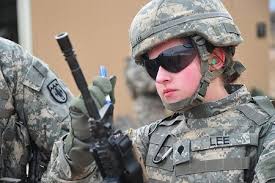When President Obama called the recent U.S. military announcement that all combat roles will now be open to women a “historic step forward,” the image that came to mind was of someone marching resolutely off a cliff.
There is something alarming in a purely practical sense here. The U.S. military is currently an all-volunteer force, but young men are still required to register in case conscription is reactivated. Will young women now have to follow suit? And, if compulsory service is ever reactivated in the U.S., will women be drafted too?
More immediately troubling, though, is the position implied by the military: that there is no meaningful difference between men and women.
I don’t doubt that women, like men, with proper training, can be effective fighters. But are women soldiers an enlightened expression of a new womanhood, or a benighted attempt to subvert the truth that men and women have different roles? And are women in the military a true feminist accomplishment, or an unintentional statement that natural masculine strength is some ultimate ideal?
Some segments of contemporary society think they have the answer. We, though, who take our attitudes from the timeless truths of the Torah, and who recognize that, like Avraham Avinu, we must sometimes take our places on “the other side of the river” of the Zeitgeist, know better.
The very idea of gender roles rankles these days. People unaccustomed to thinking hard assume that prominence and power are measures of importance and worth. And so, if public leadership roles, or shul roles or military ones are reserved for men, that perforce belittles women.
Is the undercover agent, though, less important than a foot soldier? The orchestra’s bassist less a part of the performance than the lead violinist? The researcher less significant than the surgeon? We all have roles, some of them assigned us by genealogy (no point in aspiring to kehunah if one’s father’s a Yisrael), some by talent (accurately shooting basketballs is something forever denied some of us), some by gender (no man can ever be as good a mother as a woman).
And prominence is no measure of import.
The Gemara in Kesuvos (67b) tells of the amora Mar Ukva, who, each day, on his way home from the beis medrash, would quietly leave some coins near the door of a poor person. One day, he stayed late and his wife came to fetch him. Together they walked, making Mar Ukva’s usual detour to leave the coins in the regular place. As they placed the coins, they heard the poor man approaching the door. Realizing they would be spotted and wanting their charity to be anonymous, they fled; and the poor man, intent on identifying his benefactors, gave chase.
The couple ducked into a large outdoor oven. Unfortunately, its floor and walls were terribly hot. Mar Ukva felt his feet begin to burn. His wife, noticing his discomfort, told him “Put your feet on top of mine.” He did what he was told; his wife did not feel the heat. Their pursuer, having lost sight of his prey, returned home.
After the incident, Mar Ukva was depressed. Why had his wife, and not he, merited the miracle? “Don’t you see?” she explained. “I’m in the house so much more than you, so I have many more opportunities than you to give tzedakah to the poor who come to our own door. And the food and drink I give them is immediately useful, unlike the money you give. And so, with regard to charity, my merit is greater than yours.”
The account really says it all: What counts over our limited years on this earth is not the prominence we acquire but the merit we achieve; not our particular roles, but what we do with them. Mrs. Mar Ukva’s “limited” role as someone running a home was what had merited a miracle, a miracle denied her scholarly, prominent husband.
The quest for women’s equality where it is compelling – when it comes to things like equal pay for equal work or the right to be fully respected – is just and proper, and deserves our support.
But pursuing an artificial man-woman “equality” in some quasi-mathematical sense denies reality and can only promote societal dysfunction. Roles matter, and it is folly to imagine that fairness is well served only if there are women tank-gunners – if womanhood is gauged by measures of manhood. The contemporary world could learn much from the Mar Ukvas.
© 2015 Hamodia

